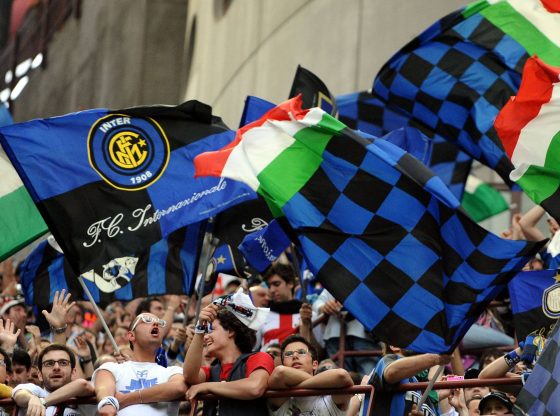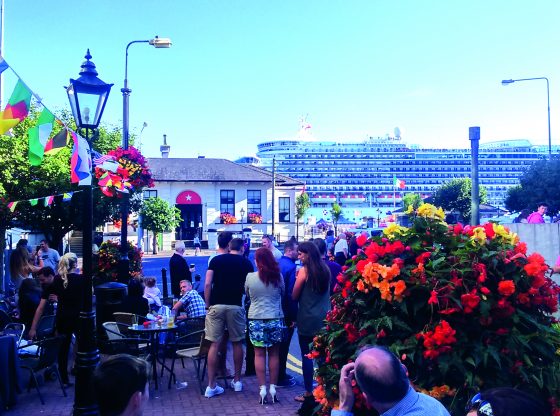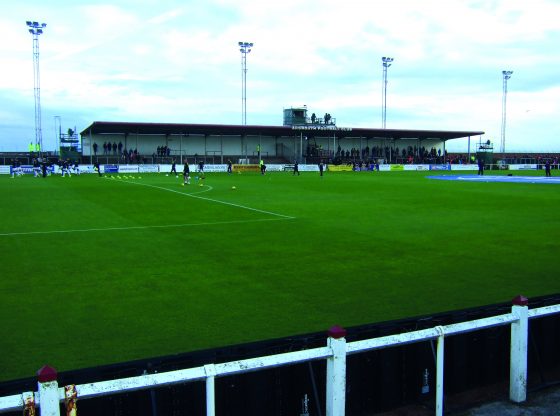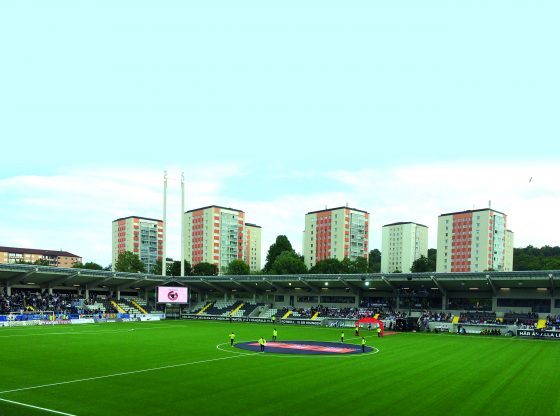Football in Lyngby, Denmark
Neil Fredrik Jensen visits Lyngby, the new boys in the Danish Superliga
Lyngby back in Superliga
The bunting has been up for a while in Lyngby. It is a leafy and slightly sleepy town that forms part of Storkøbenhavn (greater Copenhagen) for the local football club, Lyngby BK are back in the Danish Superliga. The Danes don’t need much encouragement to wave their flag around, but Lyngby’s success this season represents something of a comeback story.
Lyngby, or to use its proper name, Kongens Lyngby (translated – King’s – which makes it sound rather regal) is a typically neat Danish town. It’s known for being the home of porcelain production rather than football.
This is a club whose roots go back to 1921 when Lyngby were formed. But it has also had its problems. It wasn’t my first visit to the ground – I actually played football on the adjoining park when I was 12 years old and staying in Lyngby with my aunt. It’s changed a lot as in 1971, the club were playing in the third division (east).
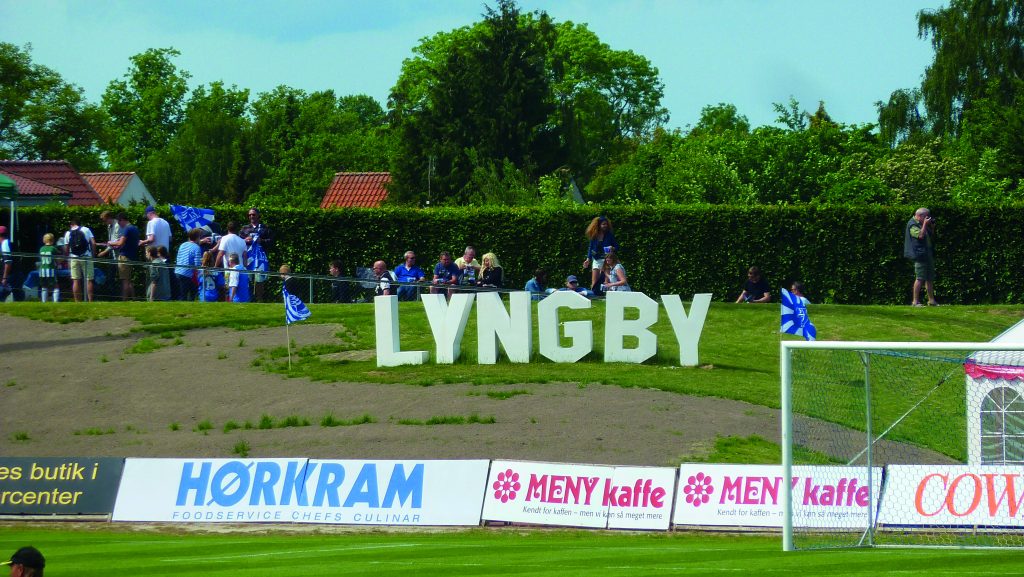
In 1992, Lyngby were champions for only the second time, but nine years later, they were bankrupt. As is the custom in Danish football, Lyngby were relegated to the non-league structure from the Superliga, Danmarks Serien. By 2007, they were back in the top flight, but they went straight back to the first division. In 2010, they won promotion again, this time lasting two seasons before being relegated in 2012. After four seasons in the upper quartile of the first division, Lyngby have reclaimed a place in the Superliga.
Lyngby Stadion
Not everyone epitomises the ever-smiling, ever laid-back hygge*-devoted Danes, though. On my journey I encountered a very unhappy couple who berated me for daring to ask the way to Lyngby Stadion. Loosely translated, they told me they do not speak to foreigners, but then I was informed by a passer-by the reason they were so wary might have been because of some recent incidents in the town where elderly people had been robbed by migrants. I wasn’t going to waste time defending myself or start discussing a topic that is very sensitive right now across Europe.
Undeterred, I caught a glimpse of the floodlights and could just hear some chanting coming from the stadium. A gang of Vikings were gathered around the Finn Ind Øl og Vinstue bar across the road from the ground, topping up on Carslberg or Tuborg before the game. It was hot – some 23 degrees – so the beer was going down well. Inside, the locals were enjoying the pre-match vibe as Lyngby celebrated their promotion.
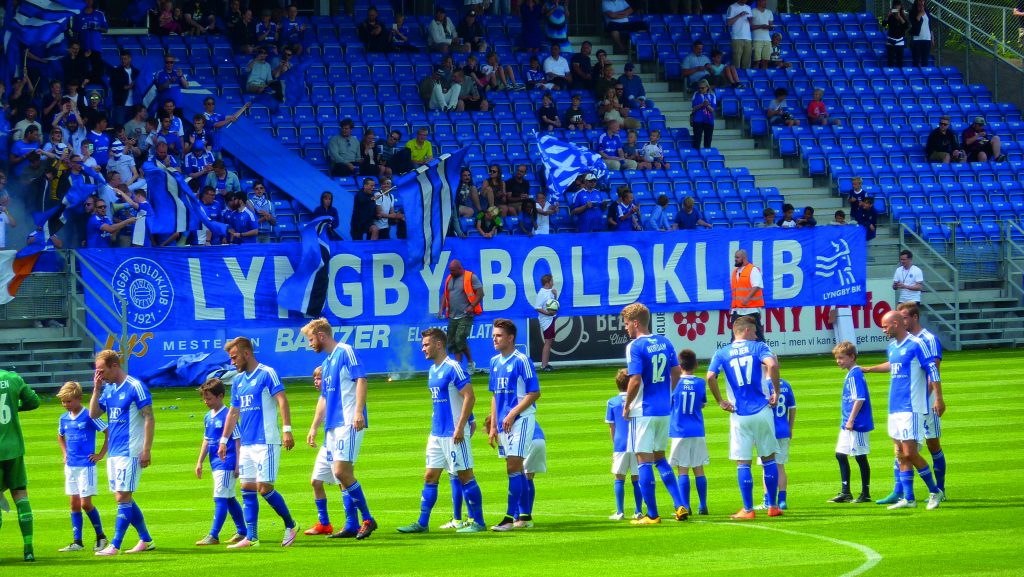
This was a good year to go up, because the Superliga was being expanded to 14 clubs. Lyngby will be joined by Silkeborg and Horsens next season. Since winning promotion, Lyngby, unsurprisingly, had taken their eye off the ball, and they had lost their last home game against Vendsyssel, their first Division One defeat of the season at Lyngby Stadion.
Their opponents for the last game of the campaign were Fredericia from the Jutland peninsula. There were no visible signs of any away support, but then there was nothing left to play for. Today was supposed to be about mild celebration for Lyngby and a time to look ahead to fresh challenges. Whether Lyngby can sustain Superliga football remains to be seen, although there were signs that they are preparing for life at a high level.
One end of the ground, a large freshly concreted terrace area was not being used and was clearly part of “work in progress”. On both sides of the ground there were covered stands, but much of the buzz was coming from the grassy bank where most of club activity seemed to be taking place. From one end, which rises up behind the goal and acts as a thoroughfare to the main stand, you get a good panoramic view of the stadium.
Lyngby attendances
The dynamics have changed in Denmark over the past 20 years and certainly altered since Lyngby were at their peak. FC København and Brøndby now command crowds of 13,000-plus, which somewhat dwarfs the sub-1,500 attendances at Lyngby. Since 2000, FCK have won 10 of 17 Superliga titles. It’s a long way from the days when seven teams won the title within a decade. In other words, it’s a more predictable Superliga, dominated by the wealthy.
When Lyngby last won the title, they averaged 4,000 people for home games. Given that the town of Lyngby has around 11,000 people, an average of 1,200 isn’t too bad, but the lowest support in the Superliga in 2015-16 was Hobro’s 2,500.
The beer and sausage men were doing a roaring trade before the game and beer was flowing from the various stands dotted around the ground. “The best pølser in Danish football,” said my cousin Jesper, a native of Lyngby. Having already had my fill of herrings and rye bread before the game, I was not in need of the famous Lyngby pølser. Besides, my other cousin, a Brøndby fan, told me that the finest sausages were served outside FCK’s Parken.
Pre-match celebrations
I was in desperate need of shade from the sun, however, and you sensed the players were too. It was a slow-motion 90 minutes, apart from the action in the main stand where Lyngby’s fans were determined to send their heroes off into the summer in good spirits.
Clouds of smoke welcomed the teams and there were a few pre-match celebrations. When Fredericia came came onto the field, though, there was barely a whisper.
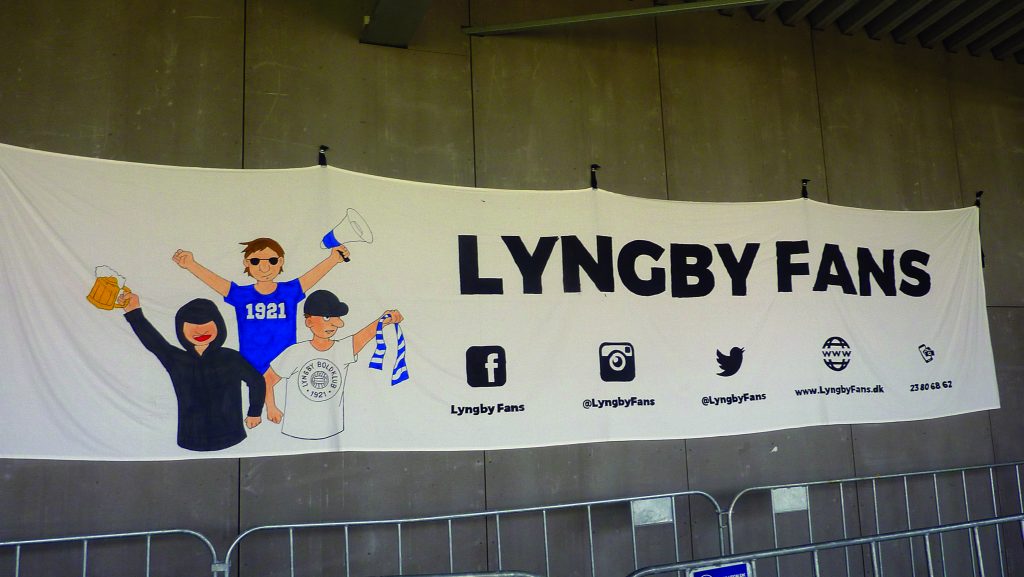
Lyngby v Fredericia
Lyngby took the lead after 16 minutes through Lars Brøgger Hansen, a player who appeared to have classic Nordic looks. The former Roskilde forward rounded the Fredericia goalkeeper and slotted past Thomas Mikkelsen with ease. This suggested the home team would have it all their own way, but Fredericia were happy to be party-poopers. They equalised in the 22nd minute through Frans Putros (a goal that was greeted with absolute silence, so much so you could hear those sausages sizzle in the concession stand).
After the interval, the visitors looked the better side for long periods. They scored their second goal after 66 minutes when Dennis Høegh netted from close range after a nice passing movement. And just as Lyngby were getting used to the idea that they may actually lose, Fredericia did it again. Anders Hostrup grabbed a third as the Lyngby defence stood and watched him slide the ball into the net.
Defeated
The introduction of South African striker Bradley ‘Surprise’ Ralani added some energy to the home attack. With 10 minutes remaining, they were awarded a penalty, duly converted by leading scorer Fredrik Gytkjaer. They couldn’t quite save the day, which was disappointing for the 1,441 crowd, but they were still singing “Su-Su-Superliga”.
How will Lyngby fare in the Superliga? Manager David Nielsen is clearly expecting a tougher league than he’s been used to as coach. He told the Danish media: “We are going to stand for the things we have always stood more. We will play the Lyngby style, but we must survive at all costs. We cannot be a soft touch.”
** Hygge – The Danish ritual of enjoying life’s simple pleasures
Neil Jensen is a corporate journalist and freelance football writer. He runs a website, Game of the People, which looks at football in all corners of the world, including the social history, politics and finance of the game. Visit www.gameofthepeople.com
This feature first appeared in Football Weekends magazine, a UK-based magazine for football fans who enjoy travelling throughout Europe. Magazines are posted worldwide: for details visit www.footballweekends.co.uk
Book a trip to Denmark with Nickes.Com!

